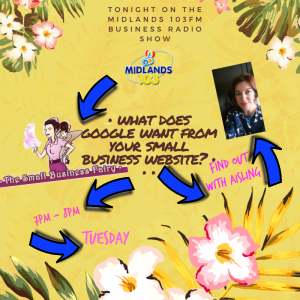 This week on the Midlands 103FM Business Show with Claire O’Brien I summarised the main SEO points when considering “what does Google want from your small business website?” Again, our segment time was limited so I focused on the 3 most important pieces of the SEO jigsaw. Google wants to create the “perfect internet experience” for every searcher on the planet. So what does this mean? It means that for every search term typed into the little white box, Google wants to return the best article with the best answer. By the way when I talk about “Google” I am referring to all search engines. Google controls 3/4 of the worlds search so those of us in the industry tend to just use the word “Google” instead of “search engines”.
This week on the Midlands 103FM Business Show with Claire O’Brien I summarised the main SEO points when considering “what does Google want from your small business website?” Again, our segment time was limited so I focused on the 3 most important pieces of the SEO jigsaw. Google wants to create the “perfect internet experience” for every searcher on the planet. So what does this mean? It means that for every search term typed into the little white box, Google wants to return the best article with the best answer. By the way when I talk about “Google” I am referring to all search engines. Google controls 3/4 of the worlds search so those of us in the industry tend to just use the word “Google” instead of “search engines”.
 Whenever a search term is typed into the wee white box, Google runs 200 checks in the nanosecond it takes for the results to come back. It’s such an amazing feat that it can produce results so quickly. However, this means that you need to have some form of plan put together to ensure your website is correctly set up.
Whenever a search term is typed into the wee white box, Google runs 200 checks in the nanosecond it takes for the results to come back. It’s such an amazing feat that it can produce results so quickly. However, this means that you need to have some form of plan put together to ensure your website is correctly set up.
The 3 main things Google is looking for, from your business website, are Relevancy, Recency and Authority. “So what does that mean?” you ask. Let’s take them one by one.
RELEVANCY
 It’s really important that you produce content that is relevant to your target audience. Remember Google wants to give a great user experience to the visitor. If you product top quality content (images, pdf’s, information, videos etc) that content also tends to get shared naturally by others, another notification to Google that your site is the one that should rank first. Google is constantly developing it’s algorithms and the Panda Algorithm is looking for poor quality content sites so that those sites get pushed further down the search results.
It’s really important that you produce content that is relevant to your target audience. Remember Google wants to give a great user experience to the visitor. If you product top quality content (images, pdf’s, information, videos etc) that content also tends to get shared naturally by others, another notification to Google that your site is the one that should rank first. Google is constantly developing it’s algorithms and the Panda Algorithm is looking for poor quality content sites so that those sites get pushed further down the search results.
The Hummingbird Algorithm is looking for semantic search terms related to your industry. This means you need to use all the terms that are relevant in your piece. For example if you are an osteopath, you should talk about “migraines”, “tension headache” etc, Don’t just keyword stuff the piece as this will open your website up to penalisation by Google.
You can help yourself here too by ensuring that when using images you give those images a search engine friendly name. This gives you a double whammy in search terms as you have an opportunity to get found under Google image search.
RECENCY
 As Google is trying to give the searcher the correct information, it’s always going to rank a competitor site higher if that site has relevant and more recent content than yours. Make sure that your website is frequently updated.
As Google is trying to give the searcher the correct information, it’s always going to rank a competitor site higher if that site has relevant and more recent content than yours. Make sure that your website is frequently updated.
Integrating your Twitter stream is one way of keeping the site moving but it’s not enough. Ideally you should be blogging. A static site (ie the old fashioned sites that contain 5/6 pages that never change) are in serious trouble at this stage of the game. You can get a blog integrated into a static site. As regards content, look for guest bloggers or use any news paper articles that you’ve been involved with. Talk about things that matter to your industry and visitors.
AUTHORITY
 Finally, you need to prove to Google that you are the authority in this space. You have to prove you are the expert. This involves a link building strategy where the name of the game is to have as many people sharing your website and content as possible, with links pointing back to your website.
Finally, you need to prove to Google that you are the authority in this space. You have to prove you are the expert. This involves a link building strategy where the name of the game is to have as many people sharing your website and content as possible, with links pointing back to your website.
There are a few ways you can kick start this. One way is to create a LinkedIn business page and post regular articles to it that contain a link back to your website. You could share part of a blog post with a link back to the full original post on the company website.
On the radio show segment, I gave the example of a small food producer. One of the key linking strategies for that business would be to get a link back from a newspaper or magazine that has a large circulation online. If a small food producer could get a link from The Farmers Journal or Country Living Magazine back to their website, Google would consider that business more important than another who doesn’t have that link. Target sites that Google sees as important in your industry.
Listen to the segment here:
I hope you enjoyed our whistle stop tour of SEO and what Google is looking for from your business. Please note that SEO is a large jigsaw and these are just some of the things you need to consider when undertaking a search optimisation project. We offer SEO audit reports for your website if you’d like an over view as to where you may be going wrong. The reports start at €450 (ex vat) and contain details instructions and advice as to what you should be doing to help your website rank for your industry. Please email, or ring us, if you’d like us to look at your website for you.
On last weeks business radio show I spoke about 5 online Tools to help boost a small business.


